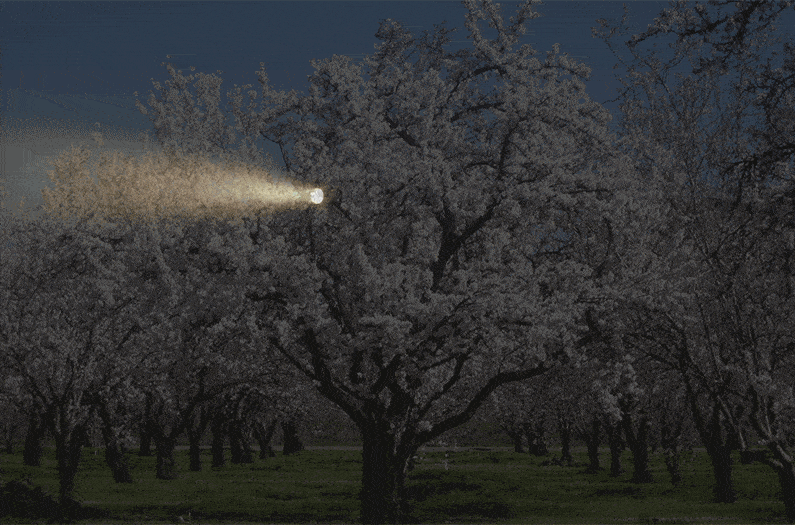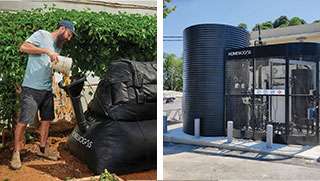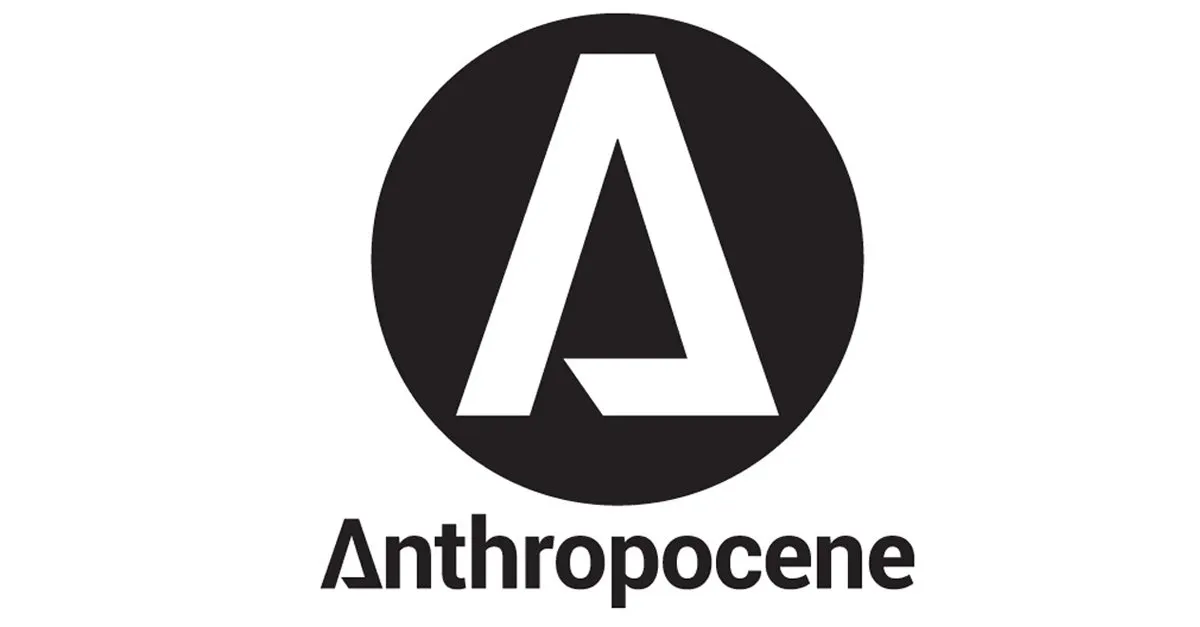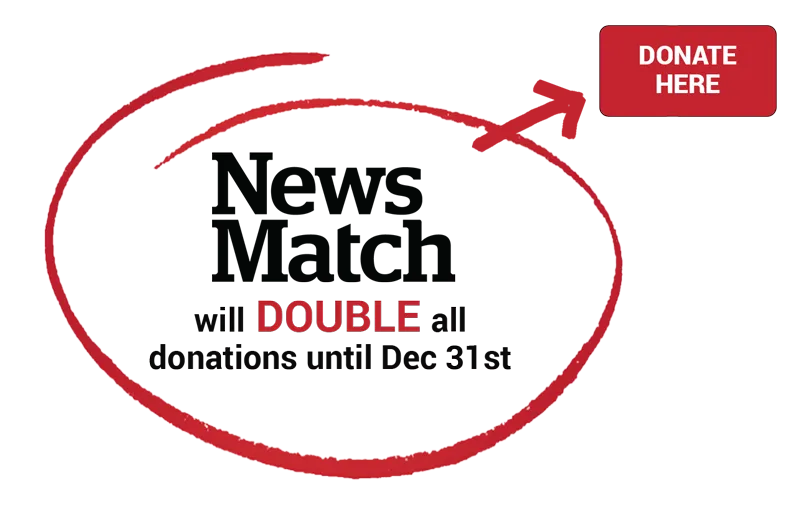
THE CLIMATE PARABLES | FICTION
The Almond Pirates
In a future metropolis built deep into the walls of a canyon where it is cooler than the scorching surface temperatures above, the search for a lost cat uncovers an intricate waste recycling system and a band of almond pirates stealing precious water.
By Annalee Newitz
The Climate Parables series engages the powerful imaginative forces of science fiction to explore what it’s like to live in a future in which humans have discovered creative ways to mitigate climate change—and live well. Learn more here >
Irving the cat was not in his usual spot on the bed, and Shruti was starting to freak out. It was the trepidation that all animal friends experience when their companions act like living creatures instead of cuddly automated blobs. Black curly hair still tangled from sleep, she checked the usual hiding places. The chair by the front window was bare. Maybe the utility niche? That’s where geothermal heat pipes built into the cliff wall studio warmed the floor to perfect feline napping temperature.
But Irving wasn’t there either. She padded barefoot back to her front step and lifted a hand to shield her eyes from the morning sun reflected in a city-sized mirror perched high above her, on the canyon rim.
“Irving! Time for breakfast!”
As she waited, Shruti gazed along the seven-kilometer length of the long, jagged canyon metropolis. On this level, 500 meters below the surface, Deepleaf’s residents were popping in and out of densely-packed rows of houses like hers, built into the layers of sedimentary limestone that striped the canyon walls. Funiculars made poop poop noises on their tracks, while bridges connecting the city’s pulsed with foot and traffic.
“Irrrviiing!” Shruti called again. Nothing.
Unsettled, she crossed the street to the guard rail, leaning forward to peer at the river gleaming at the city bottom, 1,200 meters below. She could barely see the rough shapes of the city’s metabolic infrastructure. That’s where she’d met Irving five years ago, in a waste reclamation warehouse, snatching bits of protein from the compost bins. He was a thick white cat with a dollop of caramel-colored fur on his head and a tail that took a sharp turn where he’d broken it as a kitten.
Young Irving was feral but not exactly a wild-type creature. When Shruti had run a reader over his dirty back, it showed an advanced synthetic microbiome that kept him healthy and infertile. She had fed him a little dried shrimp from her lunch, and Irving bonked her knee with his head, claiming her as his own.
Thinking back to that day gave Shruti an idea. Maybe the cat was headed down to his juvenile haunts in the lower levels? Getting down there at a cat’s pace would only take a couple of hours. Her pulse ticked up with worry. She imagined Irving injured and helpless on a train track—or drowning in a recycling tank. There was no way she could go to work with this on her mind.
Gotta take the morning off, Shruti texted her co-workers. My cat Irving is missing and I’m going to look for him.
Sympathy piled up in the chat from her friends on the fluid recycling team.
What oh no Irving!
Oh Shruti I’m sorry let us know if we can help.
Give the big guy a hug when you find him!
Check behind the composters—cats love the warmth.
That’s a good idea, she replied. Thanks everybody!
With renewed determination, Shruti packed a lunch and started her descent.
Irving the cat was missing. Shruti crossed the street to the guard rail along the rim of the canyon city. Leaning forward to peer at the river gleaming at the city bottom, 1,200 meters below, she could barely see the rough shapes of DeepLeaf’s metabolic infrastructure.
By midday, she had nearly reached the river, now so loud that it harmonized with the hum of urban life. Compost pipes spat a slurry of table scraps into digester tanks as big as houses. Shruti felt a rising sense of dread. This was Level Zero, and there were a lot of hot, dangerous machines down here.
“IRVING! WHERE ARE YOU?”
She stood for a minute, expecting nothing. Then, from behind one of the giant tanks that hugged the canyon wall, came an unmistakable yowl of distress.
“Don’t worry! I’m coming!”
Another yowl in response, this time more frantic. Cinching her pack tighter, Shruti crawled behind a fat cylindrical tower where bacteria metabolized food scraps and sewage, purifying the water inside and generating cooking gas and fertilizer. But there was no unhappy white cat with a caramel head.
And then she saw a wide crack in the wall, which smelled incongruously of fresh air—and echoed with a frustrated orrrowwww. What the shit? This wasn’t on any of the city maps.
“I’m here, Irving!”
She switched on her goggles’ lights and stepped into the crack that wasn’t supposed to exist. The walls were slimy, and her shoes skidded slightly on the wet floor. After a few meters, the tunnel turned abruptly to the right and she squinted at a brightly lit doorway. Framed by the threshold, Irving dangled in mid-air, snared in a mesh vermin trap.
The cat struggled, fur puffed out, legs twisted painfully in the wire. Leaping forward with a cry, Shruti pulled a multitool from her belt and cut him down. For a minute, there was nothing in the world except Irving’s damp fur, his beloved thick body, and a lot of disentangling. He clung to her, front legs draped over her shoulder, head pressed to her ear. His purr, normally a low rumble of contentment, now throbbed with the strong staccato of anxiety.
The human and the cat stood at the edge of a long, cavern, its high ceiling criss-crossed by pink grow-light strips. Dozens of wires sprouted from the walls along with pipes labeled “potable water” and “Bokashi digestate.” Her gaze followed them to the center of the room. What she saw pulled her mouth into a deep frown.
Growing in a massive box of synthetic topsoil was a grove of almond trees. There must have been at least 30 of them, each taller than she was, with trunks as thick as her thigh. Tucked among their spoon-shaped leaves, seed pods were bursting with sweet, tender meat—a delicacy so precious, so costly to produce that it was only reserved for very special occasions like the Harvest Festival, where she had eaten a slice of blueberry frangipane cake last year.
Shruti’s mind swarmed with ecosystem inputs and outputs, and her anxiety curdled into wrath. The amount of water required to rear such a resource-intensive crop was astronomical. It appeared the pirates had tapped into the community water main and had siphoned off a stream of nutrient-rich digestate tea coming from the composters. None of the runoff was being reclaimed either. The fluid recycling engineer part of her brain recoiled at how much these almond pirates had taken from Deepleaf.
Furious, Shruti captured the room on video with her goggles, logged its coordinates, and forwarded them to the Department of Public Works with the subject line: “Water resource theft, with possible community map tampering.” Still hugging Irving, she wondered how those thieves would feel if they had to dangle from a net bag all morning.
The human and the cat stood at the edge of a long, cavern, its high ceiling criss-crossed by pink grow-light strips. Dozens of wires sprouted from the walls along with pipes labeled “potable water” and “Bokashi digestate.” In the center of the room, growing in a massive box of synthetic topsoil was a grove of almond trees.
The more she thought about whoever had planted those trees, the more incensed she got. It wasn’t just that Irving could have died down there. It was the affront to community care. People needed that water to live. Deepleaf’s fragile ecosystems needed it. What kind of cesspit of a person would sacrifice the city’s precarious homeostasis for a dollop of frangipane? She slammed her front door, scaring Irving into his favorite hiding place under a chair stuffed with coconut fiber.
A text arrived on the house media box in the kitchen.
DPW inspectors request your input into an investigation of the rogue agricultural installation in Level Zero. Please join us at your earliest convenience.
There was just enough time to give Irving some food before Shruti had to fold a data pad into her pocket and head out. She managed to catch the downtown funicular, swiping a hand over the door to activate an exchange token: 20 minutes of labor swapped for a day pass.
The DPW main campus was three levels down, its offices spread along a terraced city block planted with fir trees. At the main entrance, a harried-looking woman with green hair and grimy overalls approached her with a wave.
“I’m Zenith,” she announced. “DPW called me in because I do recycling. You’re with Water too, right?”
“Reclamation, yeah.”
Zenith wiped her palms on her coveralls and extended a hand. “Sorry I’m not really dressed for the occasion. I was fixing the evaporengine on one of the storm water retention ponds when your alert came in. Bob from Community Ops is waiting for us in a meeting room.”
Shruti followed Zenith down the limestone hallway, its walls carved from sediments left by an ancient sea that covered this continent millions of years ago. Pictures hanging next to office doors showed how the river had cut this canyon through the ages, starting with the Cambrian and ending with the last years of the Anthropocene. It was strange to imagine the whole region underwater, but even stranger to picture the landscape above them two centuries ago, covered with inefficient sprawl, toxic farms, and machines that carbon loaded the atmosphere.
Like most people in Deepleaf, Shruti had immigrated here from the upland farms when she was younger, after living in a few different villages on the plains. Her parents preferred the villages, and her sister had taken to the caravan life. But Shruti was one of those rare people who loved the high-density buzz of urban community. Aside from Deepleaf, she knew of only two other cities: Tsaile to the east and Oakland way out on the Pacific coast. Their people packed themselves into pyramids that towered over the earth rather than burrowing into it.
Shruti nearly bumped into Zenith as the Water worker abruptly stopped and opened a door. A dark-skinned man she assumed was Bob stood to greet them, his bald head reflecting the green-yellow algae lanterns glowing overhead.
“Thanks for your report, Shruti,” he said. “About a year ago we started hearing about untraceable almonds being sold. Now we know where they were coming from.”
“We caught the pirates, too,” Zenith added.
“Already?” Shruti was surprised.
“Yeah.” Bob raised his eyebrows. “One of them hacked the city map to hide that quick-grow cave and didn’t do a very good job covering his tracks.”
All three of them sat down, and Bob continued. “I just need a little more information about what you saw and how you found it.”
But Shruti wasn’t interested in telling the story of her lost cat again. Her rage had seeped back. “Do you know how much water they took?” she demanded. “They tapped into the waste fermenter and an old wash-station line, totally violating the water regs.”
“We need you and Zenith to calculate that now, so that we have it for the restoration.”
Inwardly, Shruti groaned. The fleshbags of untreated sewage who planted those almonds didn’t deserve a restoration. She recalled the sound Irving made in the net trap and wanted to scream.
For the next hour, she and Zenith combed through Deepleaf’s water usage logs, line by line. The losses were mostly a few liters here, a few there from hundreds of different sources: water vapor escaping the evaporengines, accidental spills, pipe breaks, that sort of thing. But as Zenith scrolled through the log entries, something caught Shruti’s eye.
“Stop,” she said. “Go back three days. Ah-ha. OK, back three more. Yep, look at that.”
Shruti pointed to a log entry. “It’s 62,000 liters—exactly 62,000—draining through the same valve every three days. That has to be them. They didn’t even try to make it look organic!”
Zenith threw her hands in the air. “How did we not see this?”
Shruti sighed. “I mean, we’re looking mostly at efficiency statistics, not at the operations of one pipe in the water reclamation warehouse. Still, we should probably update the diagnostic algorithm to flag water losses that have this kind of regular pattern.”
Zenith shrugged. “I guess nobody expected a covert operation like this. I mean, it’s disgusting. So wasteful.”
Shruti frowned. “It’s not just wasteful. It’s murderous.”
“I wouldn’t go that far,” Zenith said. “Maybe you should cool down before the restoration starts. Take a walk or something.”
Shruti barely held herself back from spitting out a nasty reply before stalking out of the building and into the street.
The late afternoon light was starting to wane, and redirection mirrors bounced slanting beams down to lower levels. As she rounded a switchback, Shruti looked over the edge and saw clouds of bats silhouetted by sodium lamps in the deepest part of the canyon. The diminutive mammals dove toward the river in search of bugs, while humans on the night shift took funiculars to the surface to tend carbon sequestration ponds and wind turbines.
Still obsessing about the almonds, Shruti realized she was hungry. Her favorite sandwich popup was down the block, and she traded four days of work for a few luxurious avocado slices on top. Another water-intensive crop, costly but worth it. She wondered what it would be like to eat a sandwich made of nothing but avocado, with all the spices and trimmings. Incredible, probably. Maybe that was the kind of thinking that inspired the water thieves — the desire for more delicacies?
Whatever the motive, it struck her as profoundly unhealthy. Despite all her years of training, it was going to be hard for her to attend this restoration with an open mind.
Explore the science behind the fiction

Innovative biodigesters turn food and feces into carbon-neutral cooking gas, fertilizer, and hot water.

A liquid made from food waste and drip-fed into soil could protect crops from pathogens

Harvesting the energy from natural water evaporation using special evaporation-driven engines could generate enough power for most of the United States
Shruti returned with her half-eaten sandwich to find Bob and Zenith already seated in DPW’s big conference room. Anyone could convene a restoration, as long as they assembled the appropriate ethics counselors, stakeholders, affected parties, and publicly announced the meeting so that community members could observe and weigh in. The room’s picture window faced the street, and Shruti calmed herself by looking at the hanging gardens half a kilometer across the canyon. Birds dove in and out of the greenery, while a mountain goat grazed alongside.
When the two accused agricultural workers entered the conference room, Shruti was surprised to recognize one from her daily commute on the funicular. Tall and tanned, with a shock of white hair, he always had his nose in a book. He must live in her neighborhood. The other one was shorter, wearing coveralls smudged with dirt; they had clearly been working the fields when the summons came. Both looked intensely unhappy.
Bob introduced them as they took their seats: the tall one went by Squirt, and the shorter one was called Les. A few additional Water staff entered as well, while a couple dozen popped onto the wall screen.
“Begin recording,” Bob began. “In accordance with the Restorative Justice Act of 2165, I have convened this proceeding on to restore what Les and Squirt have admitted to stealing….” Shruti tuned out as he launched into a formal explanation of their offence and the losses it had caused to the community in power, in water, and in trust.
His preamble complete, Bob turned to Shruti and Zenith for the water analysis. Unfolding her data pad, Shruti read aloud: “Over the past year, you’ve taken what we estimate to be 7.584 million liters of water out of our stores. That’s enough to supply households for several years, with recycling.” She paused, trying not to snap at them. “Also, you scared the shit out of my cat Irving with your trap. He could have been really hurt.”
There were frowns and murmurs of resentment from everyone assembled.
“Thank you, Shruti,” Bob said. “Now the rest of you may ask questions or make comments. Remember, we have all taken an oath to keep our remarks constructive and focused on community needs.”
A chaos of voices filled the room. From the wall screen, as well as from the table, people spoke up to vent their feelings and offer ideas for restoration.
“Don’t you two work in Agriculture? How could you do something so destructive?”
“Put them on permanent sewage filtration duties.”
“Are almonds really so good that you would deprive your neighbors of water?”
“Cut their food budgets so that they have no luxuries for a year.”
“Make that five years.”
“Garnish their water budgets until they make up the loss.”
“Do you want to destroy our city and join a scavenger caravan?”
The accusations and suggestions piled up and Bob nodded respectfully, taking notes. At last, Shruti couldn’t take it anymore. She stood, pointing at the spreadsheet she and Zenith had loaded into her data pad. “Look at what these people have taken from Deepleaf. I say we exile them. Let them learn how hard life is without a city to care for you.”
A hush fell over the room. Her outburst was almost as shocking as the crime itself.
One of the ethics counselors spoke up. “You are not asking for restoration, Shruti. You are asking for punishment.”
“I’m asking for justice!”
“You may ask for anything, but I am telling you now that exile is not an appropriate restoration. Feel free to consult the reparations and law database, or set up an appointment with me if you want a more in-depth explanation.”
Humbled but still annoyed, Shruti sat down. Ethics counselors were like elders—you listened to them because they actually had historical evidence to justify their claims.
The ethics counselor nodded at Bob. “You may continue.”
“Squirt, Les, now is your chance to respond,” Bob said.
Les hung their head, mumbling at the table. “We took water from the city, and we didn’t allow it to flow back into the system. That water was lost forever. We didn’t want to hurt the ecosystem, but I understand that we did.”
Nodding, Squirt spoke next. “I’m not trying to excuse our behavior, but we never intended for it to get this big. We were just going to grow one tree, for my mom’s frangipane—but then other people wanted some, and it got bigger and….” Abruptly, he turned to Shruti, shame on his face. “I am so sorry about what happened to Irving. We set that trap because some squirrels were getting into the trees. I didn’t think anyone would get hurt. Is he OK?”
Reluctantly, Shruti acknowledged Squirt’s kindness with a nod. “His pride is injured, but otherwise he’s fine.”
“You may make any final statements now,” Bob said.
“Does Irving like shrimp?” Squirt asked.
Shruti was nonplussed. “He’s a cat. What do you think?”
It's time to upgrade not just our technology, but also our collective imagination.
Discover Anthropocene’s newest and most forward-looking project: Climate reporting from the future.

After more arguments and back channel texting with the ethicists, the community came to a decision before dinner.
“Squirt and Les, you will be responsible for relocating the almond trees and figuring out how to water them with available resources,” Bob read from a crumpled data pad. “But you also need to prevent other people from doing this, too. We think you should study the water inputs and outputs in Deepleaf and then design a subroutine for the water monitoring algorithm that can detect suspicious water losses. Next time, we want to catch something like this before it gets out of control.”
“I don’t know anything about how to do that,” protested Les.
“Then take some classes to figure it out. Or convince a team to work with you,” said Bob. “That’s a good way to restore your connection to the community.”
The Water department actually did need that algorithm, and Shruti had to admit it wasn’t a bad outcome. Still, seeing Squirt on the funicular every day was going to piss her off.
Squirt spoke the closing words of the restoration. “We agree to the community’s decision, as long as the community will have us.”
Everyone piled up their chairs and winked out on the monitors. Before he left, Squirt shuffled awkwardly over to Shruti.
“Hey,” he said softly, “Sonya at the shrimp farm on our block owes me from a trade.” Seeing the look on Shruti’s face, he grimaced sadly. “A legit trade. For housework. Here – get Irving some dinner.” He pressed his hand to hers, activating a data transfer that passed his trade on to her.
The canyon walls ran with pink light as the sun sank, and on her way home Shruti picked up Squirt’s gift of fresh shrimp. It would be perfect with the tofu in her cold box, along with a nugget of spicy bean paste, some garlic and ginger, and a little sesame oil. As she cooked, the tension of the restoration melted away. Irving was weaving between her legs, giving her calves the occasional bonk with his head, and securing far more shrimp than was strictly necessary for his dinner.
As she ate in front of the windows, she saw Squirt go by on the street, book under his arm. He looked dejected, and for a moment she felt a sense of righteous indignation. He should feel bad! Then again, he had promised to help secure their water tracking system. And the shrimp was good. A more neighborly feeling grew in her heart.
She stuck her head out the window. “Hey Squirt, you better bring me that algorithm by fall!”
He started, then turned around. “I will. I hope you’re enjoying that shrimp, Shruti and Irving.”
She pretended to scowl, and he pretended to cower, and Irving grabbed another shrimp off Shruti’s plate while she wasn’t watching. Maybe it wouldn’t be so hard to see Squirt on her morning commute after all. As she turned back to her meal, the funicular grumbled by, descending into a city whose dwellings seemed to melt into the Earth as the shadows piled up and the thick stream of the Milky Way rose overhead.
_____________________________
Annalee Newitz writes science fiction and nonfiction. They are the author of Four Lost Cities: A Secret History of the Urban Age and Scatter, Adapt and Remember: How Humans Will Survive a Mass Extinction, which was a finalist for the LA Times Book Prize in science. As a journalist, they are a writer for the New York Times and elsewhere, and have a monthly column in New Scientist. They have published in The Washington Post, Slate, Popular Science, Ars Technica, The New Yorker, and The Atlantic, among others.
What to Read Next
Waterhouse Down
A reporter visits the first subsea condominiums off the Great Barrier Reef in 2083. But what happens when the environment turns less pacific?
Solastalgia Meets the Alps
My job takes me to faraway places. My daughter calls it witnessing the death of the Earth. She is wrong. I’m recording a fight to maintain hope.










